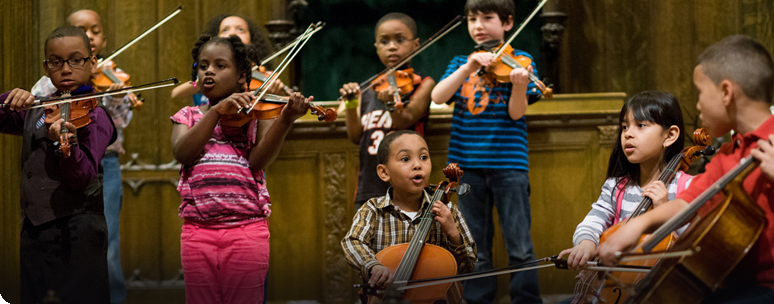A Voice Exclaiming: the Composer Speaks
Kareem Roustom, the Emmy-nominated composer of A Voice Exclaiming, has written music for film, television, the concert hall and album projects. Steeped in the musical traditions of the Near East and trained in Western concert music and jazz, Syrian-born Roustom is a musically bilingual composer who has collaborated with a wide variety of artists ranging from the Kronos Quartet, to Shakira, and to the Philadelphia Orchestra. For more information visit www.kr-music.com. About A Voice Exclaiming, Roustom says: "A Voice Exclaiming takes its title from the opening lines of ‘The Quatrains’ of Omar Al-Khayaam, a celebrated 12th century Persian poet. I knew Al-Khayaam’s text best in the form of a song from the late 1940s by Egyptian composer Riyad Al-Sunbati that he composed for the great Egyptian singer Umm Kulthum. This song, titled Rybaiyaat Al-Khayaam, begins with the following lines: I heard a voice exclaiming out in the darkest hours of the night, calling “Arise! before Al-Khayaam’s deeply contemplative poem opens with language that urges the reader to wake up and actively seize the moment before life passes by. The voice in the text can perhaps be associated with the divine, but it could also be a calling to seek in life something greater than the mundane, deep sleep being a metaphor for blind acceptance or willful ignorance of greater things. However one chooses to interpret the text, it says to me that this is an urgent call and one that must be heeded. This is the inspiration that I sought to bring to this work – the rejection of ignorance and the mundane, and the passionate seeking out of deeper meaning.
I. Divisions – This movement resulted from a challenge that I posed to myself to combine two languages, Near Eastern Arabic music and Western concert music, into a cohesive and balanced musical work that avoids clichés. In my work I try to avoid shallow combinations of disparate musical elements. To put it in culinary terms, rather than sprinkling a little ‘exotic’ spice after the meal has been cooked, I prefer to have these ingredients in the original marinade. In other words, it is the very structure of the piece with which I seek to fuse Arabic and Western elements. To that end, I decided to work with a loose sonata form for this movement. Though this framework is not new, it allows a familiar form to become a vehicle for an unfamiliar melodic and harmonic language.
May the death of your son give life to those who seek it. “Thus the daughter of Zion cried, causing all those who looked May the death of your son give life to those who seek it.
May the death of your son give life to those who seek it. Since the spring of 2011, which marked the beginning of peaceful protests in Syria and then devolved into a brutal crackdown by the government, every piece of music that I have composed, with the exception of film music, has reflected on the destruction of my homeland and the subsequent suffering of millions of civilians. This powerful and moving hymn has been a source of solace to me and I was particularly inspired by the rendition that was recorded by Syrian mezzo-soprano Ghada Shbeir. If you are in any way moved by this performance, I urge you to give to organizations working with Syrian refugees in and around Syria. Doctors Without Borders, Mercy Corps and A Heart For Syria are a few that are providing badly needed aid. III. Dabké – Dabké is a folk dance and a type of Near Eastern line dance that is typically performed at joyous occasions. The leader of the dance line, called a hawaash, directs the movements of the dancers behind him. There are many variants of this dance that involve men and women and I felt that this ideal of a communal, inclusive dance best supports the inspiration behind this project with the ideals of Community Music Works and the Kronos Quartet. This movement is based on a six beat dabké rhythm called sudaasi." Tickets are $28-65 and are available online at first-works.org or 401-421-4281 |
